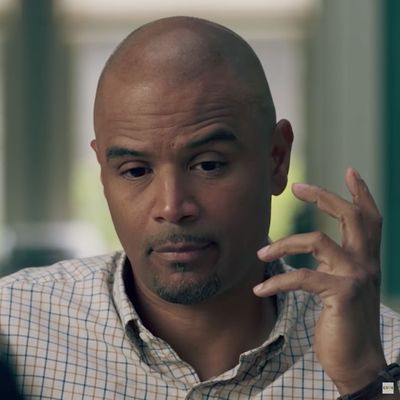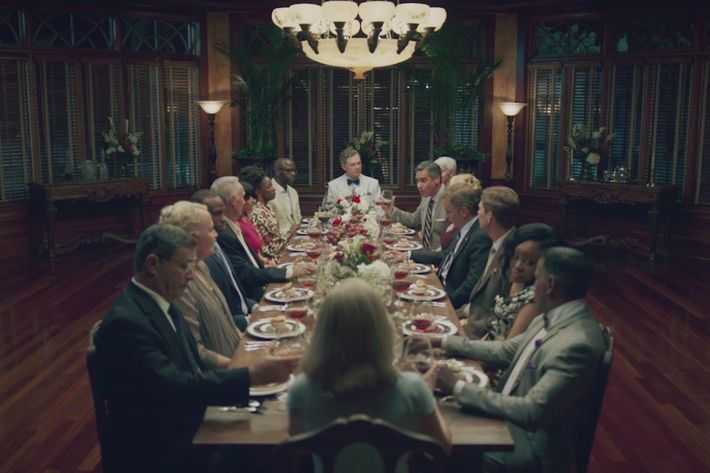
More than once, I found myself brought to tears by Queen Sugar’s midseason finale. It’s an immensely dense episode whose beauty and emotional landscape is worthy of study. There’s a lot to discuss in “Freedom’s Plow,” from Charley struggling in the face of Remy’s chilly indifference to Violet’s fainting spell. But first, I want to highlight the show’s greatest strength: its visual language.
To put it simply, Queen Sugar is one of the most visually astute shows currently on air. Part of that is the simplicity and finesse of its visual grammar, which is evident in this episode directed by Amanda Marsalis (who is also a photographer) and written by Anthony Sparks. Yes, Queen Sugar is gorgeous in all the ways we expect of television now. Its color palette is rich and highly evocative of the rural Louisiana I know and love. But the framing and blocking of actors is what stuns me most. Take, for example, a moment nestled into Nova’s arc this week involving a rather hellish dinner she attends with Robert.
Nova runs to Atlanta to spend time with Robert not wholly out of love, but a desperate need to escape the animosity boiling over among her siblings. The mix of emotions that Rutina Wesley has on her face complicates whatever romanticism is on display (like Nova slipping into the backseat of Robert’s car after they park to have sex!). Nova’s vacation away from life hits a snag when she attends a get-together with Robert’s longtime friends. I instantaneously recognized their brand of white southern masculinity: old money, narrow-minded, and unabashedly racist. Dinner with them goes as well as you’d think. It’s merely tense until Timothy North, a contributing editor for the Real American publication that Nova clearly loathes, starts speaking. Timothy obviously doesn’t give a damn about masking his more loathsome qualities. He describes himself as a “real deplorable.” His first words to Nova are even an insult. “Impressive … especially for someone I never heard of,” he says, describing her work at a symposium he attended. The dinner scene only increases the animosity several notches.

Consider how much work the establishing shot accomplishes, despite lasting for only a few seconds. We’re privy to the entirety of the dinner table, with the camera at the very end and looking slightly down at the party. The table is overcome with expensive food, floral arrangements, and wine. Nova immediately stands out, thanks to the pattern on her gorgeous outfit and to the texture of her hair. The decadence of the scene is undercut by Timothy’s virulent racism. He talks about “controlling growth,” and his hate of immigrants and the poor. As he continues talking, it’s clear that what he really desires is a new eugenics movement, which Nova calls attention to. “Who decides who’s unfit and undeserving of the American dream?” she asks pointedly. It isn’t lost on Nova what it means for Robert to move through this world, or the comment one of his friends made earlier about him being a Democrat now. Disgusted by what she’s hearing, Nova leaves the dinner abruptly and isn’t assuaged by Robert’s comment that he had to play the game to find power. How can you not hate the player when the very game he plays is what keeps black and brown people oppressed? When Robert shows up at Nova’s doorstep after she returns to New Orleans, she’s willing to hear him out (thanks to Violet telling her he deserves a chance). The conversation about ways to help make a difference and his apology leads the way to an impassioned kiss. Robert is willing to go the distance for Nova. But you know who isn’t exactly willing to go the distance for anyone but himself? Davis.
The last thing I want to witness on Queen Sugar is Davis getting a happily ever after. Sure, people can change and grow, but I’m not sure I trust him given what he’s put Charley through. Yet here Davis is on a date with the pop star, Tamar, we saw a few episodes back at Habitat for Humanity. I knew she’d return. She’s obviously intrigued by Davis enough to say, “Maybe we can be each other’s second chances.” Seriously? Of course, Davis lies to Micah when he asks if he can bring his girlfriend Keke over, claiming he’s in a business meeting. You know, the kind of business meeting that involves hand-holding and wine-drinking. This lie almost immediately blows up in Davis’s face when Micah, Keke, and her friend happen to walk past the restaurant where Davis is having his date. Micah storms in and doesn’t mince words. “You don’t waste time,” he says. Honestly, I was thinking the same thing. Davis doesn’t care that his divorce with Charley isn’t public yet, and he seems oblivious to how much the he’s hurting Micah.
Of course, part of Micah’s anger has nothing to do with Davis. He’s still reeling from his wrongful arrest, which is evident in how he bristles after noticing cops arresting several black men when he’s with Keke. As much as I don’t care for Davis, he is there for Micah when he needs him at this vulnerable time. After exploding with anger to the point that he breaks a glass, Micah tearfully recounts what happened when he was arrested: When he was handcuffed and put in the back of the police car, the officer decided to “go for a drive,” passing the police station as Micah’s fear mounted. The officer denigrated Micah, saying he can’t stand “fancy-talking niggers,” and then he stopped in a dark alleyway, repeatedly saying, “I’m going to take that spoon out of your mouth and put something else in it.” That something else was a gun — and the officer even pulled the trigger to scare Micah. All of Micah’s fear and anger come into sharp relief hearing him recount this story. It’s more than commendable that the filmmakers decided to rely on Nicholas L. Ashe’s cracking voice and worn physicality instead of a gratuitous flashback. Many TV shows and films, with Kathryn Bigelow’s Detroit being a recent example, use black pain but don’t understand it. Queen Sugar does.
While Micah wrestles with the aftermath of his arrest and his parents’ divorce, Charley is dealing with some changes of her own. Growing up, I remember my grandmother saying quite often that hair was a woman’s crowning glory. Black women’s relationship to hair is complicated by history and beauty politics. That’s why it shouldn’t be taken lightly that Charley decides to wear her hair in its natural, soft curls after seeing her Gallant magazine spread with the bold headline of “The New Real.” What’s real for a woman like Charley, whose sense of self is always under negotiation with a world that doesn’t understand her? Charley occupies a liminal space in St. Josephine: Her wealth, biracial background, and where she grew up keeps her at a distance, or at least that’s how it looks to the farmers of the collective who decide to call a meeting. They’re bothered by her magazine profile and worry that owning this mill is a temporary way for her to figure out her own identity. But it’s much more than that for Charley.
I was immensely moved by Charley discussing how she never felt like St. Josephine was hers growing up. (Something I distinctly understand as an Afro-Latina who grew up between different cultures.) “It’s home,” she says to the farmers. Her words impress them, although it takes a teary apology to soften Remy. “I’m not calculating with you,” she says. Dawn-Lyen Gardner’s acting is beautifully detailed and this scene with Remy proves it yet again. Also, I’m happy they make up. Charley deserves happiness.
I’m also happy Charley is able to patch things up with Ralph Angel during Darla’s ceremony to celebrate two years’ sobriety. Things with the farm aren’t completely figured out and the pain from Ralph Angel’s blunt handling of the will has yet to subside, but Charley would never completely cut him off. It’s good Ralph Angel realizes how much he needs her. (Of course, the electricity getting cut off will probably do that to a man.) Now, the question heading into the back half of the season is a big one: Has Ralph Angel truly grown? His toxic masculinity has been hard to ignore, especially when it comes to Darla. For Ralph Angel, family is about loyalty. But his vision of loyalty is warped. It often comes at the expense of the autonomy of the women in his life. Maybe the warning from Darla’s sponsor will get through to him: “I hope you’re good to her,” she said.
As the episode ended on Ralph Angel’s admittedly romantic marriage proposal by candlelight, I still worried about their future after Darla says yes. The grand gestures are easy. It’s the day-to-day hardships that take work. After all, love often isn’t enough. For the Bordelon family, love is a powerful fuel but there’s so much more hard work to be done.


